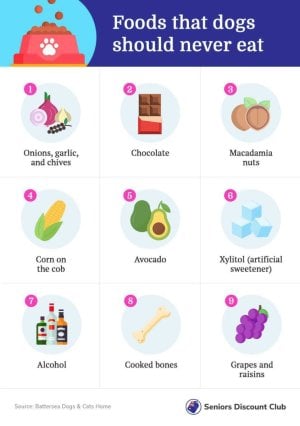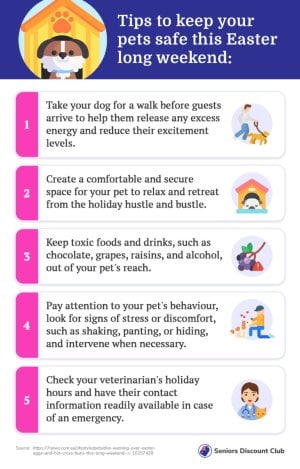Experts warn: Don't let your Easter treats harm your loved ones, including furry friends! Here’s what you need to know
By
- Replies 6
As Easter approaches, many of us are excitedly preparing for a weekend of joy and celebration with our loved ones. However, pet owners need to be extra cautious about their furry friends’ safety amidst all the fun and festivities.
The Easter long weekend can be particularly hazardous for pets if they get their paws on the wrong Easter treats.
While Easter eggs and other holiday foods may be tempting for our four-legged friends, it's important to be aware of the potential dangers and take the necessary precautions to keep them safe.
Dr Debbie Delahunty from Fur Life Vet Horsham clinic has offered an urgent warning to pet owners, saying it’s essential to keep any food within reach out of the way of curious pets, especially chocolate treats.

'The darker the chocolate, the more toxic components there are,' Dr Delahunty said.
'So, dark chocolate is more toxic than milk chocolate, which is more toxic than white chocolate. And therefore, the quantity needed to make dogs sick is less for dark chocolate than other chocolates.'
While most people are aware that chocolate can be harmful to pets, it's important to understand why.
Chocolate is made from cocoa, which contains a compound called methylxanthines that is toxic to cats and dogs. While humans can easily digest this compound, it can cause serious health issues in pets, including kidney failure.
The effects of methylxanthines on pets are similar to the effects of excessive caffeine on humans.
Cocoa, often used for baking, is the most dangerous form of chocolate for pets.
But it’s not just chocolate that can be dangerous - certain snacks humans enjoy, such as hot cross buns, contain sultanas and raisins, which can be deadly to pets.
Dr Delahuntry continued: 'A hazard pet owners should be on the lookout for this Easter is baking containing raisins and sultanas.’
'These are highly toxic and can cause significant kidney damage if ingested.'
If you suspect your pet has gotten into something they shouldn’t have, the first step is to determine the rough weight of your pet and 'guesstimate' how many grams of chocolate or other toxins they have eaten.
Dr Delahunty recommends ringing your local vet with this information, as it will make it a lot easier to provide the right advice.
If your pet displays any of the following symptoms, they may have ingested something toxic:
• Vomiting
• Diarrhoea
• Coughing
• Shaking
• Restlessness
• Trouble breathing
• Seizures
To reduce the risk of harm to pets during the Easter long weekend, experts recommend that pet owners take the following precautions:

We hope these tips will be helpful to all of you, members! Do you have more to add to the list? Let us know in the comments below, we’d love to hear from you!
Happy Easter, and have a wonderful long weekend, everyone! Be sure to keep your furry friends’ paws out of harm's way this holiday, and remember that if you ever have any concerns about them, you should always reach out to a professional immediately.
Also, for more pet safety tips, you might want to check out this article where we shared how a common garden plant can cause harm to your pets and why you should not have them.
The Easter long weekend can be particularly hazardous for pets if they get their paws on the wrong Easter treats.
While Easter eggs and other holiday foods may be tempting for our four-legged friends, it's important to be aware of the potential dangers and take the necessary precautions to keep them safe.
Dr Debbie Delahunty from Fur Life Vet Horsham clinic has offered an urgent warning to pet owners, saying it’s essential to keep any food within reach out of the way of curious pets, especially chocolate treats.

Traditional Easter treats such as chocolate eggs and hot cross buns can pose serious health risks to your pets. Credit: Shutterstock.
'The darker the chocolate, the more toxic components there are,' Dr Delahunty said.
'So, dark chocolate is more toxic than milk chocolate, which is more toxic than white chocolate. And therefore, the quantity needed to make dogs sick is less for dark chocolate than other chocolates.'
While most people are aware that chocolate can be harmful to pets, it's important to understand why.
Chocolate is made from cocoa, which contains a compound called methylxanthines that is toxic to cats and dogs. While humans can easily digest this compound, it can cause serious health issues in pets, including kidney failure.
The effects of methylxanthines on pets are similar to the effects of excessive caffeine on humans.
Cocoa, often used for baking, is the most dangerous form of chocolate for pets.
But it’s not just chocolate that can be dangerous - certain snacks humans enjoy, such as hot cross buns, contain sultanas and raisins, which can be deadly to pets.
Dr Delahuntry continued: 'A hazard pet owners should be on the lookout for this Easter is baking containing raisins and sultanas.’
'These are highly toxic and can cause significant kidney damage if ingested.'
If you suspect your pet has gotten into something they shouldn’t have, the first step is to determine the rough weight of your pet and 'guesstimate' how many grams of chocolate or other toxins they have eaten.
Dr Delahunty recommends ringing your local vet with this information, as it will make it a lot easier to provide the right advice.
If your pet displays any of the following symptoms, they may have ingested something toxic:
• Vomiting
• Diarrhoea
• Coughing
• Shaking
• Restlessness
• Trouble breathing
• Seizures
To reduce the risk of harm to pets during the Easter long weekend, experts recommend that pet owners take the following precautions:
Key Takeaways
- Easter treats can be hazardous for pets, with chocolate and foods containing raisins or sultanas posing significant risks.
- Dr Debbie Delahunty from Fur Life Vet Horsham clinic warns pet owners to keep toxic foods out of reach of their pets.
- If a pet has ingested something toxic, it may display symptoms such as vomiting, diarrhea, shaking, restlessness, or trouble breathing.
- To protect pets during Easter celebrations, experts recommend taking precautions such as walking dogs beforehand, creating a comfortable space for pets, keeping toxic foods out of reach, monitoring pet behaviour, and knowing your vet's holiday hours.
We hope these tips will be helpful to all of you, members! Do you have more to add to the list? Let us know in the comments below, we’d love to hear from you!
Happy Easter, and have a wonderful long weekend, everyone! Be sure to keep your furry friends’ paws out of harm's way this holiday, and remember that if you ever have any concerns about them, you should always reach out to a professional immediately.
Also, for more pet safety tips, you might want to check out this article where we shared how a common garden plant can cause harm to your pets and why you should not have them.









